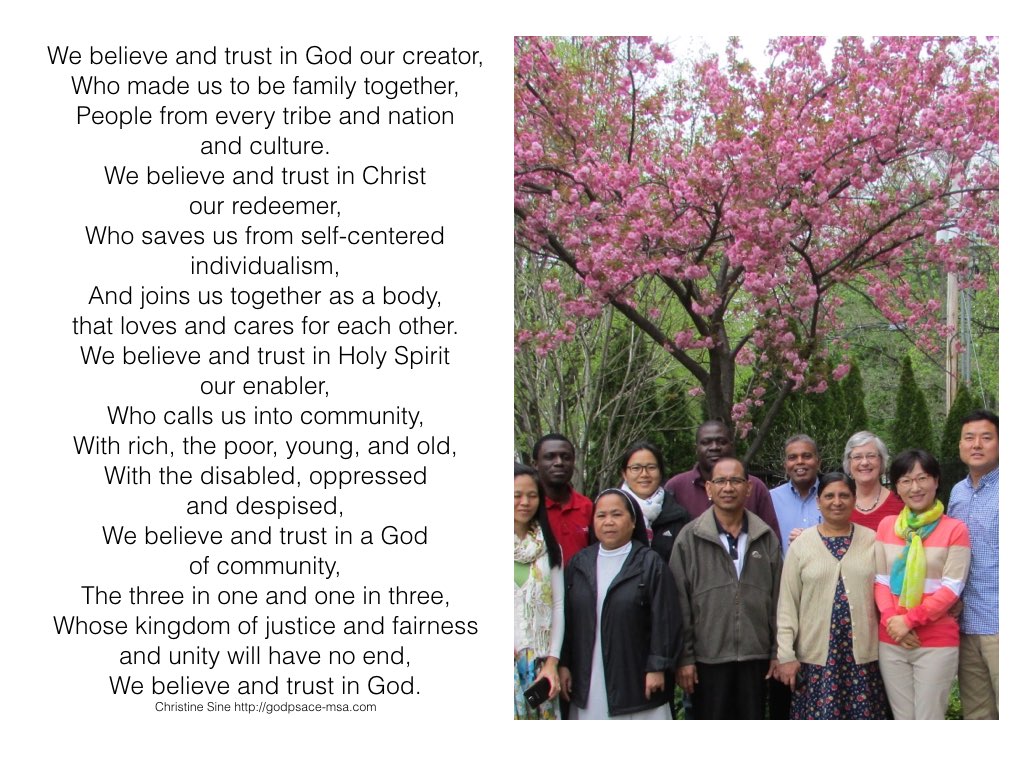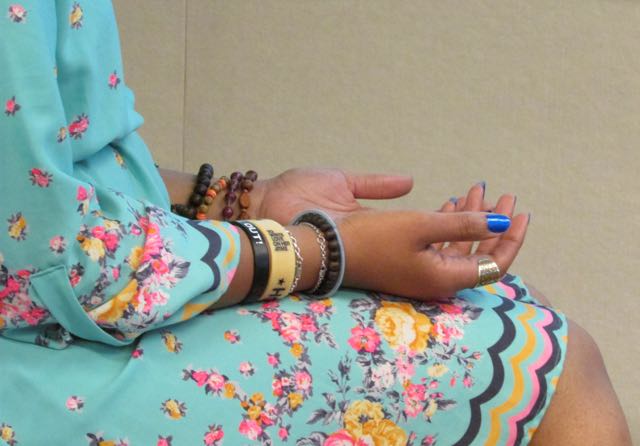At our MSA team meeting last Friday I was taken to task by one of my colleagues for saying that one of my goals here on Godspace is to give voice to those who have no voice. All people have a voice, he reminded me. We don’t need to give them voices, we need to learn to listen to what they say and allow it to reshape our faith. He is right.
In Globalizing Theology: Belief and Practice in an Era of World Christianity, we are reminded that “Christianity is increasingly at home in many cultures and will not be imprisoned by a single culture.” Christianity has become a world religion not because everyone worships God in the same way, but because everyone worships the same God in their own culturally specific way. “Christianity is a world religion because it is a local religion”. The wonder of Christianity is that it is adaptable to any culture. It is at its strongest not when we all think and worship in the same way but when we all bring the diversity of our cultural expressions of faith to worship God together in unity and respect in spite of our diversity.
What many Westerners are oblivious to is how much our theology is shaped by a Eurocentric viewpoint that arises from the place of power and privilege that our cultures have held for so long. We are also oblivious to how strongly we have excluded other theological perspectives, wanting to invite others to sit at our table and adopt our Christian cultural viewpoint rather than allowing them to invite us to create a new global Christian table together.
In a post colonial, post Eurocentric Christian world those of us from European backgrounds need to become good listeners and learners and learn to ask questions rather than provide answers. We also need to allow the theological perspectives of other cultures to shape our theology, humbly seeking forgiveness for the wrongs of the past and working for reconciliation and justice.
What is your response?
How do you feel we have imprisoned Christianity in Western culture and taken advantage of our power and privilege? Think about your own Christian worldview. how much of it has been shaped by people of other cultures, ethnicities and viewpoints? How willing are you to engage in theological discussions with those who see Jesus differently and grapple with the possibility that your world view needs to be reshaped by them?
In Foolishness to the Greeks, Lesslie Newbigin states:
The fact that Jesus is much more than, much greater than our culture-bound vision of him, can only come home to us through the witness of those who see him through other eyes.
It is twenty years now since I first read Lesslie Newbigin’s books and was challenged to read African, Asian and South American theologians. I still remember how dismissive many of my colleagues were of liberation theology which grew out a culture of oppression, of Indian theologies that grew out of cultures of poverty and of South African Black theology which grew out of a culture of apartheid. Reading authors like Gustavo Gutiérrez and Cornel West has forced me to ask uncomfortable questions that have begun to liberate me from my culture bound vision of Jesus. Listening to my friends at NAIITS and indigenous peoples in Australia and North America has even more deeply impacted me and I know I still have much to learn.
Each time I work cross culturally I try to listen for new perspectives. Often I find myself back at the drawing board wondering how I need to reshape my faith so that I am not excluding those whom God embraces. Jesus’ parables often focus on God’s inclusion of those whom the Jewish culture excluded – Samaritans, women, lepers, sinners, were all included in his embrace. I am sure that as he told these stories the worldview and the culture of the people who embraced his message was slowly changed too.
God’s family is drawn from every culture and tribe and nation. We are on a journey together learning to understand and walk together in partnership with our sisters and brothers from around the world. When we know we are all part of God’s family, we will willingly seek for understanding, reconciliation and new ways of sharing life so that we all become one community as God intended us to be.
What is your response?
We live in such a divided world. What do you think it will take for us to sit down with people of all races and cultures and create a new theological table together? Sit quietly in the presence of God and allow the Spirit to guide you. Watch the video below with images and music from different cultures. What are one or two action steps you could take to broaden your understanding of other cultural perspectives?



6 comments
Christine – thanks for this blog and the video – I loved seeing the various cultures expressing their Christian faith through their art. We’ve been blessed by our cross-cultural travel with Regent and earlier with other organziations. It has been rich and I am grateful for the broadening persepectives this kind of involvement brings.
Your welcome Bev – My world travels have so enriched my faith and broadened my perspectives. And in the process my God has become bigger and more amazing too. It is wonderful!
Rich and bracing prompt to further expand reading, reach, and engagement. I am so struck by the color and the eyes in the video. “If you believe and I believe and we together pray”: Yes and Amen. And thank you!
Your welcome Laurie
Great article. True food for thought. We have more to learn from others than teach generally:)
Thanks Lisa and yes – understanding that we have more to learn than we do to teach is I think the first step towards a truly global Christian community.